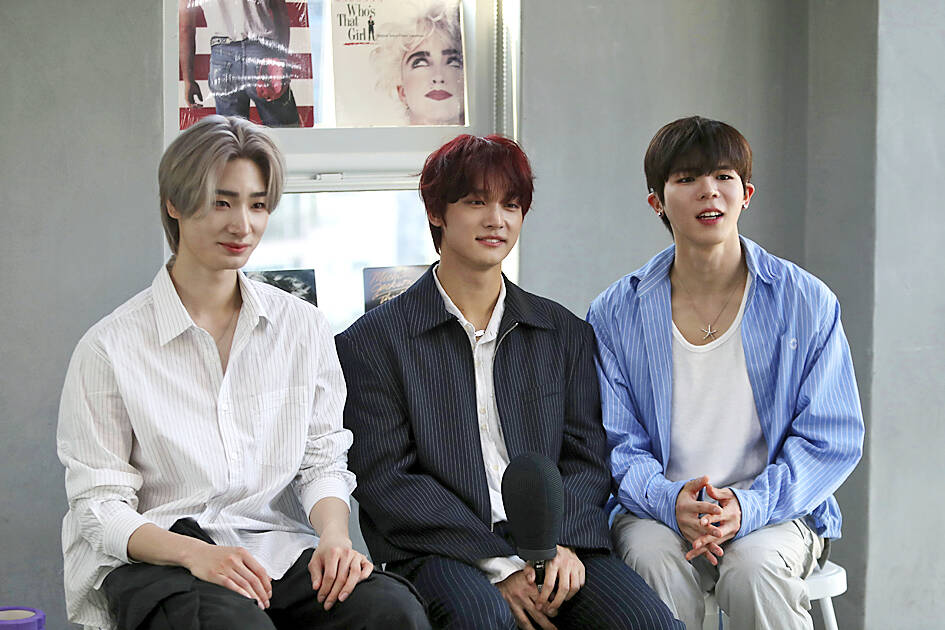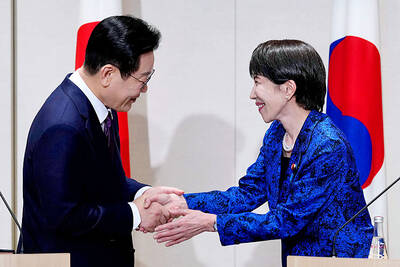Big Ocean, a three-member K-pop group composed entirely of artists with hearing disabilities, is redefining the limits of music and performance — one beat at a time.
Big Ocean seamlessly incorporates sign language into their performances, and their shows are built on extensive preparation using high-tech tools — vibrating smartwatches that pulse with musical beats and LED visual metronomes that flash timing cues during practice sessions.
This technological approach represents significant progress in South Korea’s entertainment industry, where career opportunities for people with disabilities have historically been limited.

Photo: AP
The trio, PJ, Jiseok and Chanyeon, made their debut in April last year and recently wrapped a European tour marking their first anniversary. The band performed in four countries, including France and the UK, while promoting their second mini-album, Underwater, which dropped on April 20.
To achieve the precision crucial in K-pop’s demanding choreography and music, Big Ocean relies on technologies rarely seen in the genre. Members wear modified vibrating smartwatches that deliver rhythmic cues to their wrists and practice with visual metronomes — flashing light guides displayed on monitors — to help stay in sync.
Chanyeon uses a hybrid hearing device with Bluetooth that streams music directly from mobile devices. They also use a pitch-checking app and artificial intelligence voice conversion technology to support vocal training and enhance audio output after recordings.
“We each felt rhythm differently when dancing,” PJ said. “So when we’d play the same song and dance in front of the mirror, one of us would move faster while another would move slower. To solve this timing issue, we decided to memorize everything together and create our own cues with each other.”
This precision becomes critical during live performances, where unexpected disruptions can derail even experienced performers.
“When we performed in France, our fans were cheering so loudly we lost the beat,” said Jiseok. “But we looked at each other and quickly handled the situation — just like we practiced.”
Stage effects and certain musical styles create additional obstacles.
“When a lot of smoke comes up, sometimes we momentarily can’t see the stage movements in front of us,” PJ said. “Our concentration gets disrupted instantly in those moments.”
“When there’s no clear beat in a song, it’s really hard for us to stay synchronized,” Jiseok said. “When the bass is overwhelming, it’s difficult for us to catch it accurately.”
Despite these challenges, Big Ocean’s commitment to accessibility and inclusion has inspired their global fanbase — known as PADO — which has responded with similar commitment.
“While communicating with PADO, we’ve heard that they’re actually learning Korean sign language for us, or learning various sign languages to communicate with us,” Jiseok said. “When we see how much they’re preparing and putting in that effort, we feel so grateful.”
The group uses English for basic communication with international fans and incorporates Korean Sign Language, American Sign Language and International Sign to promote accessibility and inclusion.

Indonesia and Malaysia have become the first countries to block Grok, the artificial intelligence (AI) chatbot developed by Elon Musk’s xAI, after authorities said it was being misused to generate sexually explicit and nonconsensual images. The moves reflect growing global concern over generative AI tools that can produce realistic images, sound and text, while existing safeguards fail to prevent their abuse. The Grok chatbot, which is accessed through Musk’s social media platform X, has been criticized for generating manipulated images, including depictions of women in bikinis or sexually explicit poses, as well as images involving children. Regulators in the two Southeast Asian

COMMUNIST ALIGNMENT: To Lam wants to combine party chief and state presidency roles, with the decision resting on the election of 200 new party delegates next week Communist Party of Vietnam General Secretary To Lam is seeking to combine his party role with the state presidency, officials said, in a move that would align Vietnam’s political structure more closely to China’s, where President Xi Jinping (習近平) heads the party and state. Next week about 1,600 delegates are to gather in Hanoi to commence a week-long communist party congress, held every five years to select new leaders and set policy goals for the single-party state. Lam, 68, bade for both top positions at a party meeting last month, seeking initial party approval ahead of the congress, three people briefed by

The Chinese Embassy in Manila yesterday said it has filed a diplomatic protest against a Philippine Coast Guard spokesman over a social media post that included cartoonish images of Chinese President Xi Jinping (習近平). Philippine Coast Guard spokesman Jay Tarriela and an embassy official had been trading barbs since last week over issues concerning the disputed South China Sea. The crucial waterway, which Beijing claims historic rights to despite an international ruling that its assertion has no legal basis, has been the site of repeated clashes between Chinese and Philippine vessels. Tarriela’s Facebook post on Wednesday included a photo of him giving a

NONCOMMITTAL: South Korea’s president said the world could only wait for China and Japan to resolve matters amicably through dialogue to secure regional peace Japanese Prime Minister Sanae Takaichi yesterday called on South Korean President Lee Jae-myung to help “ensure regional stability,” as Beijing pressures Tokyo over its stance on Taiwan. The two leaders met in Takaichi’s picturesque home region of Nara in western Japan, days after Lee visited Chinese President Xi Jinping (習近平) in Beijing. They agreed to strengthen cooperation on economic security, regional and global issues, as well as artificial intelligence, South Korea’s presidential office said. Looming in the background of the meeting was Japan’s heated diplomatic spat with China, triggered by Takaichi’s suggestion in November that Tokyo could intervene militarily if China attacks Taiwan. China